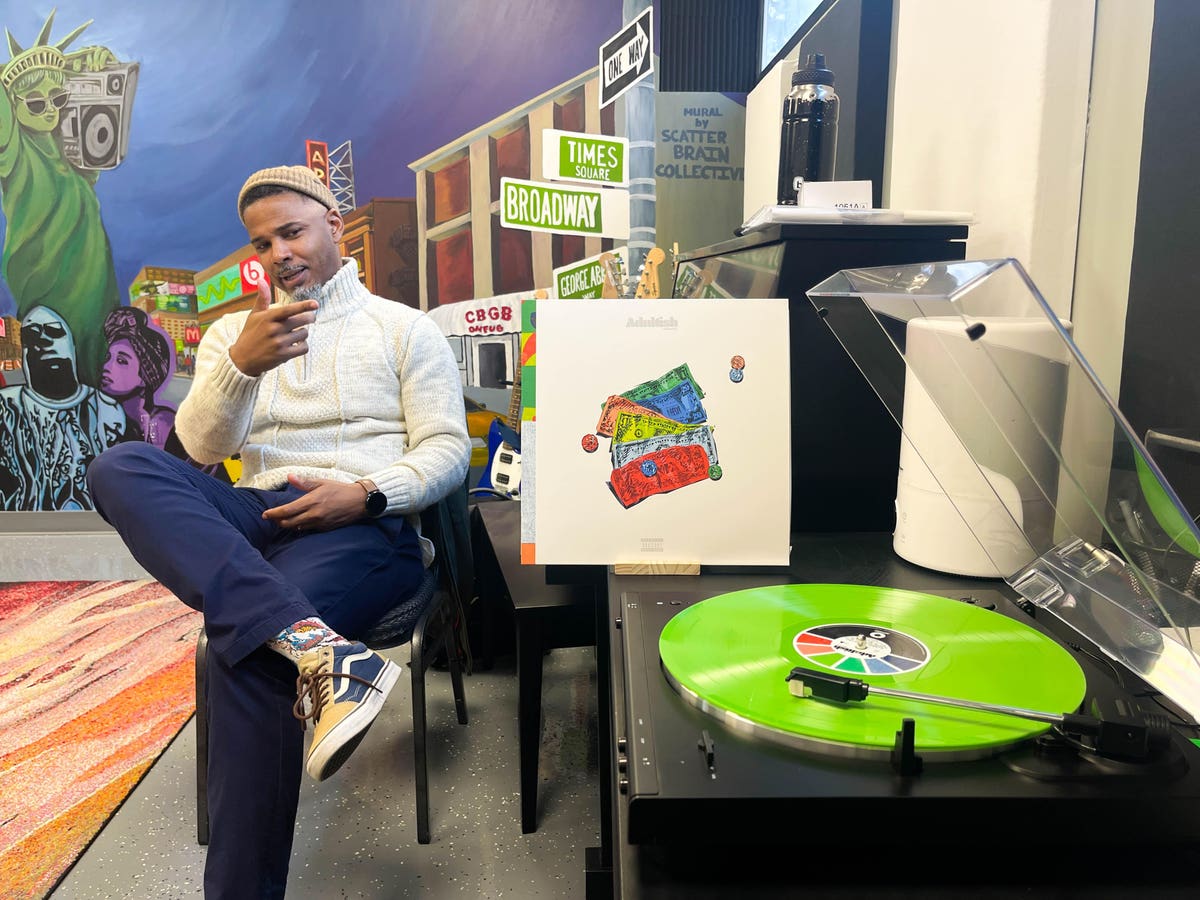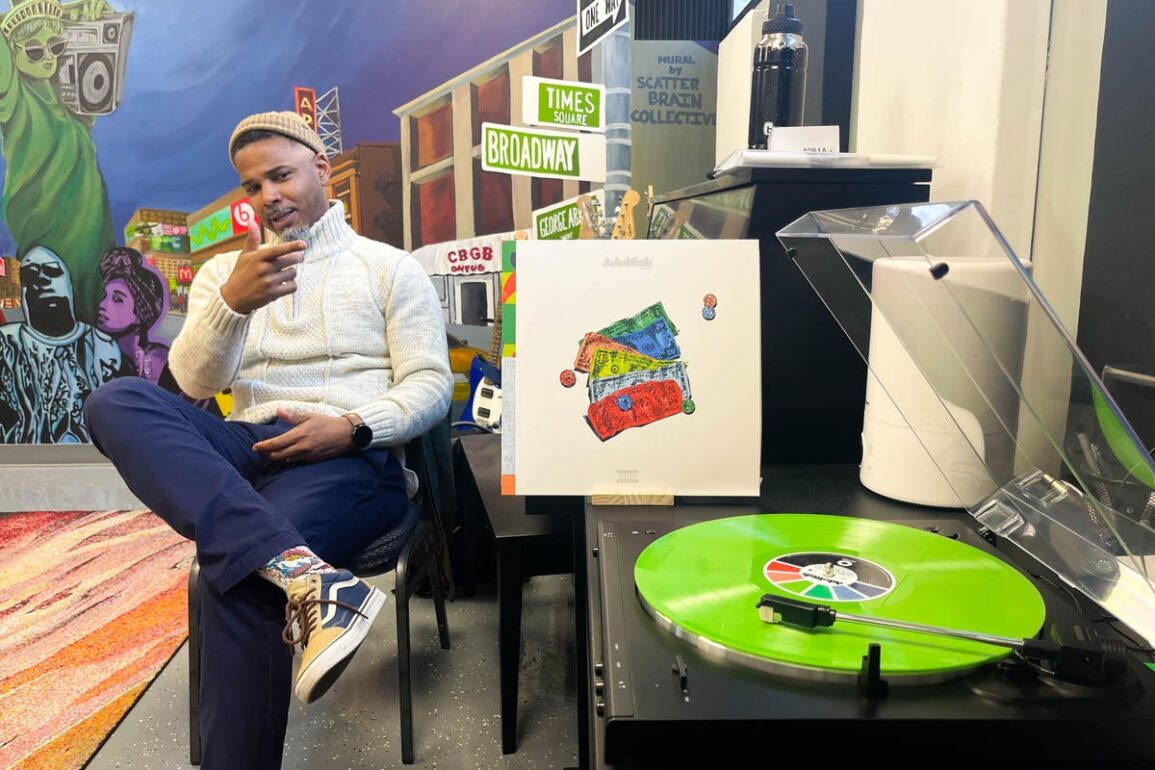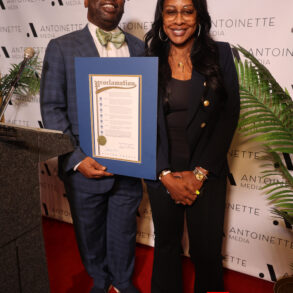
Stanley Robinson, or “Substantial” gesticulates a lot. It’s hard to capture a still photo of him. He is an animated human being who thinks in color, animation, texture and sound. This is not the typical description that comes to mind when one applies the label “hip-hop artist.” Robinson was never typical, nor did he intend to be. He grew up in Prince George’s County, Maryland during a time when the world of hip-hop was tense with battles between coasts, and sometimes artists. He was a lover of martial arts, anime and comic books in a moment where not one of those things was cool. This is especially true of some African-American neighborhoods and some corners of the hip-hop community. Yet, with the support of family and friendships that would endure a lifetime, he found his own corner.
Some of his most memorable and interesting collaborations were out of the box, such as his work with Japanese artist Nujabes on mixes of soul, jazz and hip-hop. This year, he released his latest album, “Adultish” a meditation on growing into adulthood, but not believing in growing old per se. At the same time, he reflects on growth and discovery. It is a lot. Listeners can find familiarity in tracks related to comic book characters in one turn and family in another.
Fandom And Finding Sustainable Vinyl
When talking about his career and the latest album Substantial offers gratitude for his opportunity to influence hip-hop culture and other aspects of culture, including social justice and environmental concerns. It was that gratitude and appreciation for his fans that led him to investigate sustainable vinyl. During a Kickstarter campaign, a fan commented, “Man it sucks that you still do vinyl.” Given the recent resurgence of vinyl records, the rapper was surprised at the reaction, but he realized it was bad for the planet.
The exchange and realization led to what he calls a “rabbit hole” of research that led him to a YouTuber who discussed how vinyl records contribute to poor indoor air quality, which can lead to poor health impacts for artists and consumers. Robinson has had his own respiratory issues over the years, so the message hit home. Then there are the problems with the chemicals used in production and difficulties with recycling vinyl records. Many vinyl fans may argue that they would never toss a single item from often-prized collections. Nevertheless, anything discarded has to go somewhere and items made from forever chemicals have forever impacts. “PVC and all these other chemicals are required to make it, I just hadn’t thought about it.” He added, “My whole career, the main thing my records have been sold on is vinyl, it’s how I make a living.” Robinson says that led him down another “rabbit hole,” understanding what eco-friendly vinyl is and how he could work with it.
Sustainable vinyl record on record player
What Is Sustainable Vinyl?
Sustainable vinyl is an advancement in the realm of eco-friendly materials, transforming the traditionally criticized plastic compound, PVC, into an environmentally responsible way of listening to music. Sustainable or eco-friendly vinyl is crafted from recycled materials and emphasizes closed-loop systems, ensuring that the material can be repurposed or recycled at the end of its lifecycle. As many, including Substantial, have pointed out, maintains some qualities of traditional vinyl but also offers more durability by being more scratch-resistant without sounding different. This evolution exemplifies a promising shift towards sustainable practices within industries, fostering a future where functionality harmonizes seamlessly with environmental responsibility. After watching documentaries and a BBC News special about eco-friendly vinyl, all that research led Substantial to partner with Green Vinyl Records. “It also has a longer life than the average record, so you can play it for a lot longer before the quality degrades, which is something that ‘vinyl heads’ care about.”
Substantial Being Sustainable
Robinson went on to explain that the materials surrounding his records are recyclable, down to the minutiae of plastic covers that can be reused as a protective slip rather than being tossed away. As a long-time lover and creator of hip-hop, the artist understands the power of that culture to influence. The genre’s influence extends beyond music—it encompasses fashion, lifestyle, and societal trends. When artists prioritize sustainability in their work and public persona, they set an example for fans and peers. It can influence sustainability. Knowing this, Robinson carefully thought through the environmental impact of every aspect of the “Adultish” album, he and his family recycle, upcycle and make their home life as green as possible. Even in a collaboration with the sneaker line Vans, he warns fans to be mindful of buying quality products and of shipping multiple boxes. He also uses his unique platform to underscore a number of issues that he cares about, such as financial literacy, embracing aging and social justice.
From creating an album that is some ways about authenticity and finding certain truths to promoting consciousness at home, it fits that the rapper joins other artists in pushing for sustainability and drifting away from conspicuous consumption. It is also an opportunity to spark conversations about artists as keepers and promoters of culture shifts.
This post was originally published on this site be sure to check out more of their content.









